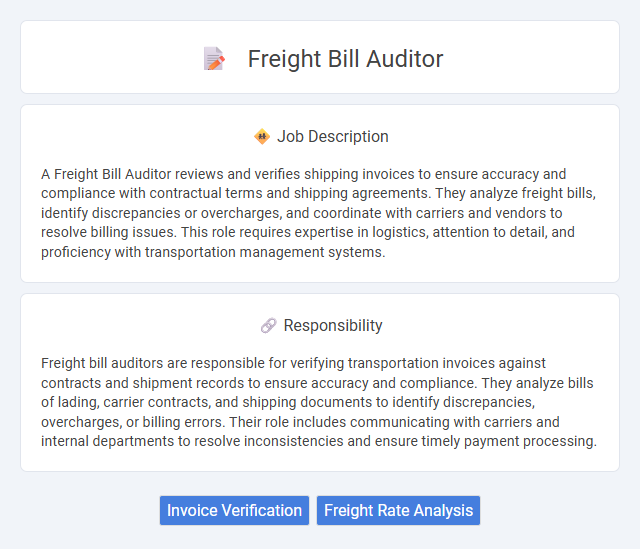
A Freight Bill Auditor reviews and verifies shipping invoices to ensure accuracy and compliance with contractual terms and shipping agreements. They analyze freight bills, identify discrepancies or overcharges, and coordinate with carriers and vendors to resolve billing issues. This role requires expertise in logistics, attention to detail, and proficiency with transportation management systems.
Individuals with strong analytical skills and attention to detail are likely to thrive as freight bill auditors due to the need for accuracy in reviewing shipping invoices and identifying discrepancies. Those who prefer structured environments and enjoy working with numbers may find this role suitable, while people who struggle with repetitive tasks or lack patience might face challenges. The job may appeal to candidates comfortable with precision and data management but less so to those seeking dynamic, high-interaction work settings.
Qualification
A Freight Bill Auditor must possess strong analytical skills and attention to detail to verify accuracy in shipping invoices, identify discrepancies, and ensure compliance with contracts. Proficiency in audit software, ERP systems, and knowledge of freight billing codes and transportation regulations are essential qualifications. A background in logistics, accounting, or finance, along with effective communication skills, enhances the ability to resolve billing disputes and maintain cost control.
Responsibility
Freight bill auditors are responsible for verifying transportation invoices against contracts and shipment records to ensure accuracy and compliance. They analyze bills of lading, carrier contracts, and shipping documents to identify discrepancies, overcharges, or billing errors. Their role includes communicating with carriers and internal departments to resolve inconsistencies and ensure timely payment processing.
Benefit
A freight bill auditor role likely offers benefits such as enhancing accuracy in cost management and preventing billing errors, which can result in significant financial savings for companies. This position may provide opportunities for professional growth by developing expertise in logistics and finance. Employees in this job could also experience improved negotiation skills by working closely with carriers and vendors.
Challenge
A freight bill auditor job likely involves the challenge of meticulously verifying complex shipping invoices to prevent costly errors and discrepancies. The role probably requires strong analytical skills to identify billing inaccuracies across diverse transportation modes and contracts. High attention to detail and the ability to navigate multiple accounting systems may be essential to manage the volume and variety of freight bills effectively.
Career Advancement
Freight bill auditors play a crucial role in logistics by verifying and auditing freight invoices to ensure accuracy and prevent overpayments. Mastery of audit software, strong analytical skills, and deep knowledge of transportation regulations can lead to career advancement opportunities such as senior auditor, audit manager, or logistics analyst roles. Gaining certifications like Certified Transportation Broker (CTB) or Certified Supply Chain Professional (CSCP) enhances professional growth and opens doors to leadership positions within supply chain management.
Key Terms
Invoice Verification
Freight bill auditors specialize in invoice verification by meticulously examining shipping invoices against contractual terms, shipment records, and carrier agreements to ensure accuracy and prevent overpayment. They utilize advanced auditing software and industry knowledge to identify discrepancies such as duplicate charges, incorrect rates, or unauthorized fees. Effective freight bill auditing enhances financial control, reduces operational costs, and maintains compliance with transportation agreements.
Freight Rate Analysis
Freight bill auditors specialize in verifying and analyzing freight rate charges to ensure accuracy and compliance with contractual terms. Their expertise in freight rate analysis helps identify billing discrepancies, optimize transportation costs, and improve overall supply chain efficiency. Utilizing advanced auditing software, they compare billed rates against agreed tariffs, facilitating cost recovery and budget adherence within logistics operations.
 kuljobs.com
kuljobs.com